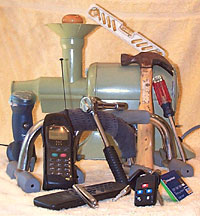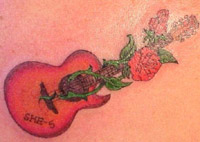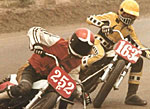![[SoundStage!]](../sslogo3.gif) The Y-Files The Y-FilesBack Issue Article |
August 2000 The Art of Listening Wickedness In a fictitious lower-Appalachian church, I follow a snake-handling audiophile's fire-and-brimstone sermon: "Father, I suffer tubesculosis. I beseech thee, please pray over me for a healing." "Well son, the cure’s simple. Straighten out thy wretched ways and walk in the Spirit of the Lawd. Your amp ain’t tube-rectumfied. You must dig a wee bit deeper before you hit musical pay dirt. Open your ear to the glory of tubes and be healed of thy malady. Sin no more or consider yourself ensnared by the Horned One." "Repent, repent" intone the supplicants in awe while the rattlers and copperhead serpents keep slithering about the preacher’s shoulders. They hiss and flick their forked tongues furiously in the air while the pastor, utterly oblivious to danger, continues his harangue. Return to normalcy Such and other nonsense keeps many music lovers occupied. Of course, I’m exaggerating to ludicrous and tasteless levels, but you’ll agree that many of us worry about the most minute of audio issues as though they prevent us from fully enjoying our systems. In other words, we’re pointing a finger. Because future installments of this column will visit the outer reaches of xtreme audio, there’ll be plenty of opportunity to believe that your own system sucks by comparison. Let’s talk about sensibility then. What set me off on today’s tangent was looking at my push-up bras -- ahem, bars. These are little elevator handles that deepen one’s extension when doing push-ups. They stare at you daily as reminder to keep with the program. Using them is said to be good for increasing the size of one’s pecs. I do push-ups for other reasons. My right shoulder joint tends to develop a nasty click and grinding noise as though the ligaments are getting too loose. My push-up routine is simply preventive maintenance. Works swell, pecs and all. Serves as antidote against laziness and keeps the rotator cuff lubed. So these little tubular metal bars have a central foam grip. One of them got chewed off when my wolf hybrid was still a non-gourmet pup. Ever since, I’ve wrapped an old dirty sock around the naked bar to absorb sweat, prevent slippage and duplicate the dressed bar in feel and thickness. I’ve never worried about upgrading or replacing it with a new one despite the relative funkiness of the solution -- I need to rewrap the sock daily after each use. Why don’t I feel compelled to go to town and buy a new set? As we all know, we audiophiles are so very fond of upgrading. This habit makes our systems permanent construction sites that never reach the move-in state to allow us to settle down. The reason it never occurred to me to upgrade my push-up bars is simply that they work perfectly, period. Ah, poor choice of language. I really need to say I make them work. On their own, they do nothing but sit there and stir up guilt. Let’s consider the ramifications. It’s my punch line. A grown man’s tool kit  You see, these push-up bars are a tool, just like the juicer, shaver, nail
clipper, credit card, car keys, hammer, torpedo level and remote control. They
don’t work per se; they’re being used. The skill of the user is as
important as the actual tool. In fact, in the hands of a master, even a dull tool creates
works of beauty, while a dweeb generates laughing stock. If a tool serves its function,
why agonize over it? Roll up your sleeves and get to work! You see, these push-up bars are a tool, just like the juicer, shaver, nail
clipper, credit card, car keys, hammer, torpedo level and remote control. They
don’t work per se; they’re being used. The skill of the user is as
important as the actual tool. In fact, in the hands of a master, even a dull tool creates
works of beauty, while a dweeb generates laughing stock. If a tool serves its function,
why agonize over it? Roll up your sleeves and get to work!
Unfortunately, audiophiles in general don’t consider their systems tools, to remain subservient to their users. Rather, they play a game of musical chairs -- the tables are turned and the system becomes master over its owner. That’s because ‘philes tend to place the entire burden of performance on their equipment. They expect it to do the job. Call it a one-way alley. No, call it a dead end. To paraphrase JFK, don’t ask what your system can do for you -- instead ask what you can do for your system. Otherwise it’s bound to lead nowhere but to frustration and empty pockets -- a case of the inanimate leading the living. The most important component in any audio system is…you This is so obvious it gets overlooked routinely. Forget those notions that claim the front-end is where it’s at. Or the speakers. Or the room. The system is simply a tool that’s gotta be used, ears-on. No user, no system. Just as your car doesn’t decide where to go on its own, you play an active part in where your system is taking you. It’s not a virtual reality that one enters as a passive somnambulist, staggering unconsciously like a marionette manipulated by a puppeteer upstairs. Granted, nobody ever bothered to write an owner’s manual for listeners. Nobody ever asks to see proof of a valid listener’s license either before selling you more audio gear. Money is to be made. Money continues to pour in when folks remain convinced that aural Nirvana is just around the bend and somehow wrapped up in newer and better hardware. The notion that listening can and needs to be learned is non-profit and essentially counter-productive to a hardware-driven industry. If you could figure out how to enjoy your system as is, without further tweaking, futzing or upgrading, you’d become a dropout. And that is the bane of any provider surviving off his repeat customers. Losing them is anathema. If this doesn’t sound right, keep reading. But understand that your audiophile career could be at risk. The following is a think piece that will sink peace into your heart if you understand it. I’ve decided to choose an example that everyone can relate to -- falling in love. Extreme sports could be used as well, but they're outside my personal experience. Meditation is brought up because I’m very familiar with it. Chances are you don’t meditate regularly or never have, but don’t worry. I’ll be as non-obtuse as I can. And never mind the prose. It’s deliberately poetic to get you into the mood -- the mood that I call "The Art of Listening." Let’s hit the road. You’ll see some familiar scenery but I hope you’ll also discover some spots you haven’t seen before. Something we can all relate to Your body is strangely agitated, filled with
energy and giving off a kind of golden glow. Your mind is unwaveringly magnetized on one
subject only. You return to it effortlessly whenever other activities free up your
attention. We know all this from experience, in more detail than we care to acknowledge. It’s too painful to remember when it’s gone. It’s easier to dismiss it as something that only happens once in a lifetime or was an illusion or faulty memory to begin with. We settle instead for the lukewarm middle ground of mediocrity and shallowness. It’s safer too. Less prone to crazy risk and sudden change. How easily justified. If we think about this issue in more depth, we come to understand something fundamental about our human condition. Whenever we participate, we become one. We somehow lose our sense of a separate self and open up to merge into something bigger. The joy, bliss and exhilaration are in leaving behind the cramp of our spectator personality. We enter an open state of free energy, deep feeling and a quiet mind. It happens to us most easily in love. In love, we become strangely both more and less -- less personality, more real. Less effort, more ease. Less contraction, more energy. Less fear, more joy. Participation is the key. It grants us full, whole-hearted, undivided attention. It musters all our capacities into one common and single event. Instead of holding back, we give. Instead of retreating, we forge ahead. When the cramp of self reasserts itself, we undermine it by confessing openly and honestly. It makes us whole and united, no longer a crowd of partial selves each pursuing its own agenda. We also perceive things whole then, consuming their gestalt rather than analyzing and dividing their details. We feel more and think less. We love and find things to be loving and lovable. Let’s call it magic. How it relates to music Music could be called the language of feeling. While perhaps not universal, it certainly is global. Feelings transcend the boundaries of words and culture. Music speaks to us primarily through feeling. As with love, we must merge into it to partake from it. We must give of our attention and all our senses. To listen to recorded music is then not a "do-me" act of passive submission. It’s not asking our stereo system to make it happen. It is an emotional gesture that we must make. While it can happen quite spontaneously, it is neither passive, automatic nor unconscious. It often surprises audiophiles to discover that most musicians own rather mediocre audio systems. The reason is straightforward: a musician is trained and skilled in the knack of tuning into music. He doesn’t require the system to do it for him by laying out all the details and cues and clues. Even the merest semblance of the overall structure is enough for him to let go. He dives in and is caught and embraced and carried by the wave that is music, riding its crests and traversing its valleys. He can catch this wave whether it brakes out of a boombox or car radio. His enjoyment is no less, nor fundamentally different, from what he might experience on a big system if he had one. Any concerns over equipment are simply irrelevant to him. He’s not in the least bothered or interested. He simply doesn’t notice. Hence the need or desire for a big system isn’t there. That’s why so many musicians irreverently decline any offers of manufacturer loans to upgrade their systems to a level befitting their status as a famous artist. Enter the audiophile Now contrast that to an ailing audiophile. He doesn’t listen to music as a big whole. He listens for attributes, concentrating on parts. He disregards the sentence in favor of the word. He misses the meaning. He doesn’t fall in love with music, which would drown out all details. He remains separated to distinguish certain features he fancies. Maybe he’s into soundstaging. Maybe timbre is his thing. Maybe bass definition and impact. He inspects these aspects and enjoys them as if they had a separate existence. By singling out the bass line of the contrabasses, he’s lost sight of the orchestra as a whole. Like a scientist, he remains aloof and doesn’t become part. This very aloofness excludes him from the sheer passion and joy his musician friend succumbs to so easily by submerging into the ocean that is the music. This audiophile somehow expects of his equipment to convince him of the reality of the sounds he’s hearing. A bare overview map isn’t enough for him; he needs a holographic likeness of superior resolution so nothing’s left to his imagination. Details are his thing, and the more his system can provide, the happier he is. He’s like a therapist who analyzes every sentence of his client for deeper meanings and possible connections, but he remains oblivious to the very real person in his chair. The whole of anything contains within it all number of parts, but none demand any undue attention or stand out to be recognized. They simply are. The music lover forgets his equipment entirely. He doesn’t need it to convince him of the reality of what he’s hearing. His conviction lies in the passion of his own abandonment into his feelings. His feelings make the whole thing real beyond a doubt. It is excessively subjective and personal, and it doesn’t occur to him that it could or should be otherwise. For that very reason, he could never be a good and objective reviewer. Time to digest Let’s recap what’s been said. We began by calling the audio system a tool. Tools prove their worth when used. Of course you sharpen them when they dull. You clean them when they get funky. You lubricate them when they get rusty. But beyond all such basic maintenance, the roles remain very clear -- you do, the tool submits to your handling. The tool never does anything without your active guidance. Audio is about emotions and feelings. Machines don’t have feelings, but we do. Obviously we can’t expect machines to create feelings for us. It’s perhaps more accurate to say that they can provide a context in which good feelings can happen. Let’s call this context triggers. In audio, these triggers are all the things that make up a relative likeness to the real thing of the live performance. Perfect matching isn’t really essential if our triggering mechanism isn’t locked, blocked or otherwise malfunctioning. In fact, it’s surprising how little likeness is required. Even a monaural car stereo in a funky rent-a-wreck can set your soul on fire if you hook up with the music, right? Problems creep in when we demand to only allow ourselves to be triggered if these cues are perfectly synchronous with the real thing. This automatically diminishes the part we ought to play. It undermines our active participation of readiness, imagination and emotional connectedness. Unused muscles go flaccid and shrink. This is true also for our capacity to respond freely and with abandonment to our audio system. Perversely enough, the more expensive and "perfect" equipment becomes, the more this is bound to happen -- it leaves no room to fill in blanks. We go on auto-pilot, and the damn system drives itself. Rather than remain active co-creators who consciously celebrate their experience by sharing in it, we turn passive. Soon we’re bound to find fault with our equipment. We no longer feel stimulated, enticed, tickled or turned on. The fun came from participating. Now we’ve given away responsibility and power -- to a machine. "Do me". Music as meditation Meditation isn’t something one can do.
It’s something that happens. However, it only happens if we do something first. This
is a bit tricky to understand. Here’s a simile -- getting wet in the rain. We
don’t make rain happen. We have to wait for it. But we only get wet if we stand
outside. Of course, it doesn’t automatically rain when we walk out the door -- that
part is the uncontrollable "happening" aspect of meditation. Sitting silently doing nothing, spring comes and the grass grows by itself. This is my favorite Zen koan. It describes the entire meditation approach in crystalline clarity. To do nothing is impossible -- it can’t be done. Doing of any sort is a self-directed activity. To stop all doing instead is still a subtle form of doing, but it does tend to create the context in which true nothing may eventually happen on its own accord. It’s like waiting, but not for anything in particular. The part that absolutely needs to be done, though, is the actual sitting -- and sitting there with a clear intent, all senses alert, body/mind in equanimity, all day-dreaming suspended. Sooner or later, mental, emotional and subtler internal activities slow down. If you’re lucky, they eventually fall away entirely. Then, without any control on your part, the mysterious nothing of meditation may arise. It cannot be described, only hinted at. It is in many ways an acute sense of disappearance of self. Simultaneously, it is the replacement of the self with a presence that distinctly isn’t self but something infinitely grander. Music can take us into related spaces of grandeur, quiet, peace and serenity. This, like meditation, isn’t something that can be done directly. But without intent, focus and a willingness to create the context, it doesn’t happen just by itself either. What each and everyone has to find out for himself or herself is what needs to be done to create this context. Or ask yourself what you shouldn’t do anymore instead. It may end up being the same thing. To get an idea where to look, think about your
personal requirements to feel "on." It could be diet, proper sleep, exercise,
creative fulfillment… it could be any number of things in combination. Think about
how it feels or felt to be in love! All these activities overlap in the way they pull our psyche together into experiencing ourselves to be in touch with whatever we’re up to. Life becomes a contact sport. We’re in communion. We’re connected. It’s exhilarating. In less drastic ways, emotional abandonment -- feeling overwhelmed and carried away into a state of self-forgetfulness or diminished concern for oneself -- can happen to music. No need to endanger your life by storming the world’s highest peaks sans oxygen, racing two-wheelers, surfing Maui or handling poisonous snakes in a Western Virginia Pentecostal church. "The Art of Listening" has nothing to do with listening "The Art of Listening" obviously isn’t peculiar to music. It’s a way of life. It’s about passion, intent, seriousness, honesty, totality, integrity, being authentic. In whatever arena of life you come in touch with these qualities first doesn’t matter. Once you get the hang, grok the knack of how to remain in this space, when it happens, you can allow it to occur anywhere. And if you do so with your music system, chances are you won’t find anything wrong with it whatsoever. Rather, you’ll remind yourself that it’s a trap to think such. Perception and reality are unbreakably interlinked. If the system seems to suck, it is your perception that says so. Since it’s yours, you can maybe do something about it -- shift focus, change perspective, drop concerns and comparisons and return to participating. It’s you, not the gear. It’s your heart beating, it’s your feelings being expanded, it’s your mind alert and absorptive. Voilą, the magic’s back. ...Srajan Ebaen
|
|
![[SoundStage!]](../sslogo3.gif) All Contents All ContentsCopyright © 2000 SoundStage! All Rights Reserved |
 Your heart is filled with song and excitement.
You’re enveloped in a mysterious aura of blessing that transforms even mundane items
into revelations of importance. My friend, you are in love!
Your heart is filled with song and excitement.
You’re enveloped in a mysterious aura of blessing that transforms even mundane items
into revelations of importance. My friend, you are in love! The absolutely essential, pro-active part is getting out of bed and
the house to roam under the wide-open sky. After that it’s trusting and waiting.
The absolutely essential, pro-active part is getting out of bed and
the house to roam under the wide-open sky. After that it’s trusting and waiting.  If you’re into extreme
sports, you know exactly what it’s like to ride a giant breaker; to whip that
motorcycle into a corner and nearly losing the rear tire; to parachute out of an airplane;
to step into a sparring ring without gloves and take a risk of being badly hurt.
If you’re into extreme
sports, you know exactly what it’s like to ride a giant breaker; to whip that
motorcycle into a corner and nearly losing the rear tire; to parachute out of an airplane;
to step into a sparring ring without gloves and take a risk of being badly hurt.